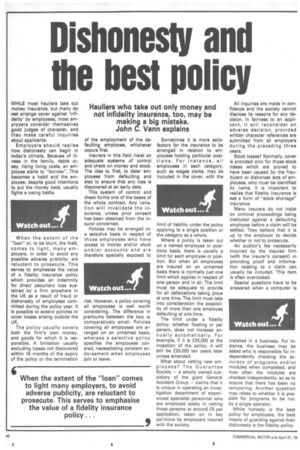Dishonesty and the best policy
Page 42

If you've noticed an error in this article please click here to report it so we can fix it.
Hauliers who take out only money and not infidelity insurance, too, may be making a big mistake. John C. Vann explains
WHILE most hauliers take out money insurance, but many do not arrange cover against 'Infidelity' by employees, most employers consider themselves good Judges of character, and they make careful Inquiries about applicants.
Employers should realise how dishonesty can begin in today's climate. Because of illness in the family, debts or, say, rising living costs, an employee starts to "borrow". This becomes a habit and the employee, despite good intentions to put the money back, usually fights a losing battle.
When the extent of the "loan" or, to be blunt, the theft, comes to light, many employers, in order to avoid any possible adverse publicity, are reluctant to prosecute. This serves to emphasise the value of a fidelity insurance policy which provides an indemnity for direct pecuniary loss sustained by a firm anywhere in the UK as a result of fraud or dishonesty of employees committed during the policy year. It is possible to extend policies to cover losses arising outside the UK.
The policy usually covers both the firm's own money, and goods for which it is responsible. A limitation usually excluding losses not discovered within 18 months of the expiry of the policy or the termination of the employment of the defaulting employee, whichever occurs first.
Insurers in this field insist on adequate systems of control and check on money and stock. The idea is, first, to deter employees from defaulting and also to ensure that any loss is discovered at an early date.
This system of control and check forms one of the bases of the whole contract. Any variation will invalidate the insurance, unless prior consent has been obtained from the insurer concerned.
Policies may be arranged on a selective basis in respect of those employees who have access to money and/or stock and/or accounts and are therefore specially exposed to risk. However, a policy covering all employees is well worth considering. The difference in premiums between the two is comparatively small. Policies covering all employees are arranged on an unnamed basis, whereas a selective policy specifies the employees covered, necessitating constant endorsement when employees join or leave. Sometimes it is more satisfactory for the insurance to be arranged in relation to employees holding particular positions. For instance, all employees in each category, such as wages clerks, may be included in the cover, with the limit of liability under the policy applying to a single position or the category as a whole.
Where a policy is taken out on a named employee or positions basis, there is usually a limit for each employee or position. But when all employees are insured on an unnamed basis there is normally just one limit which applies in respect of one person and in all. The limit must be adequate to provide for all defalcations taking place at one time. The limit must take into consideration the possibility of more than one employee defaulting at one time.
The limit under a fidelity policy, whether floating or per person, does not increase annually automatically. For example, if it is £25,000 at the inceptionof the policy, it will still be £25,000 ten years later unless amended.
What about vetting new employees? The Guarantee Society — a wholly owned subsidiary of the giant General Accident Group — claims that it is unique in operating an investigation department of experienced specialist personnel who are employed solely in vetting those persons at around £5 per application, taken on in key poiitions by employers insured with the society. All inquiries are made in confidence and the society cannot disclose its reasons for any decision. In fairness to an applicant, it will reconsider an adverse decision, provided written character references are submitted from all employers during the preceding three years.
Stock losses? Normally, cover is provided only for those stock losses which are proved to have been caused by the fraudulent or dishonest acts of employees, who must be identified by name. It is important to realise that fidelity insurance is not a form of "stock shortage" insurance.
Many insurers do not insist on criminal proceedings being instituted against a defaulting employee before a claim will be settled. They believe that it is up to the employer to decide whether or not to prosecute.
An auditor's fee necessarily incurred by the insured firm (with the insurer's consent) in providing proof and information relating to a claim can usually be included. This item is often overlooked.
Special questions have to be answered when a computer is installed in a business. For instance, the business may be asked who is responsible for independently checking the accuracy of programs and/or modules when completed, and how often the modules are checked independently, so as to ensure that there has been no tampering. Another question may relate to whether it is possible for programs to be run by a single operator.
While honesty is the best policy for employees, the best means of guarding against their dishonesty is the fidelity policy.




































































































